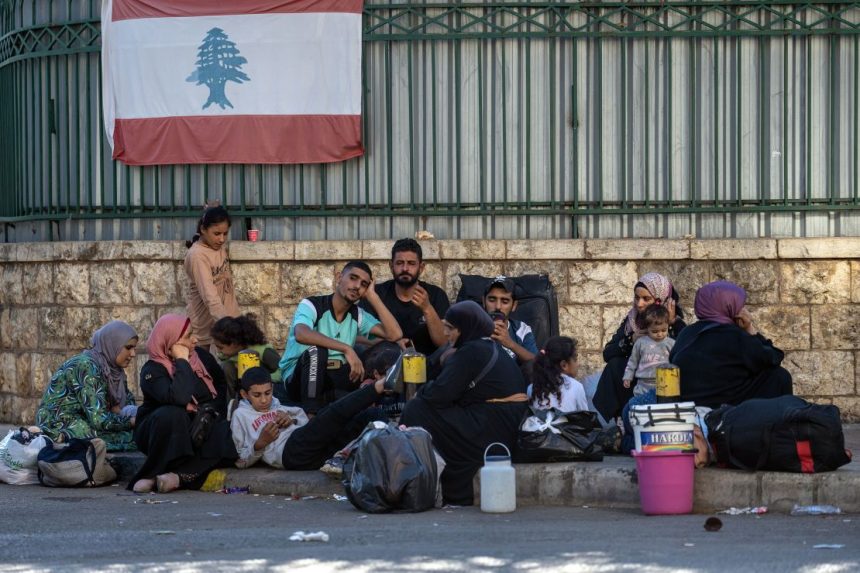In October, Lebanon entered the second month of what is now widely recognized as a full-scale war between Hezbollah and Israel, adding another tragic chapter to the nation’s long history of instability. The war has resulted in thousands of deaths and injuries, while more than one million people have been displaced within the country. It has also raised critical questions about the future costs of reconstruction.
Internal Displacement and Public Health Concerns
The intensification of hostilities and continuous bombardments has displaced approximately 1.2 million people from conflict zones, creating a severe humanitarian crisis that places immense strain on public services, including waste management. Displaced populations are living in overcrowded conditions, which heightens the risk of disease outbreaks caused by inadequate water and solid waste management. Addressing these basic needs, especially hygiene and waste disposal, is crucial. LIMS advocated for collaboration between municipalities and the private sector, particularly in waste management, through its PRISM program. By involving private sector investment at the local level, municipalities could save costs and increase revenues, while also stimulating the local economy by creating jobs and providing essential services during times of crisis. Waste collection and treatment will be a critical component of maintaining public health and clean streets during the crisis.
Economic Losses, Reconstruction, and Public Procurement
The financial impact of the war in Lebanon is staggering, with losses estimated at nearly $10 billion, or approximately 50% of Lebanon’s GDP, according to LIMS. The cost of the war should account not only for the loss in 2024 but also extend into 2025 and 2026 in addition to capital losses further exacerbating the situation. The displacement of economically active individuals from war-affected areas has further depressed the economy, with GDP growth projections shifting from a potential 1% increase to a contraction of up to -3% by the end of 2024.Infrastructure damage (including homes, businesses, roads, and essential services) accounts for about $2 billion of these losses. Reconstruction efforts will require substantial financing, which Lebanon is currently ill-equipped to provide or handle properly.
In response to the crisis, the Public Procurement Authority (PPA) has introduced special emergency procurement measures to expedite services like rubble removal and infrastructure repairs, bypassing standard competitive bidding processes. Normally, these processes, which include a 20-day announcement period and multiple bidders, ensure transparency and fairness. However, LIMS has raised concerns in a policy brief that these relaxed rules could lead to misuse. Even before the war, certain officials had bypassed procurement procedures by crafting narrowly tailored contracts and dividing large projects to favor specific vendors. During reconstruction, such practices could stifle competition and divert much-needed funds away from the intended recovery efforts.
Agriculture and Food Security
he war has caused extensive damage to agricultural areas in southern Lebanon and the Bekaa, with many farmlands burned or abandoned, severely impacting current harvests. However, LIMS notes that Lebanon’s food security remains relatively stable due to the country’s reliance on imports, which account for 80% of its food supply. Agriculture contributes 4% to Lebanon’s GDP and remains a vital source of livelihood for many displaced individuals in the south. The threat of a maritime blockade, though, could disrupt vital food import channels, potentially leading to shortages and price hikes. This highlights the urgent need for efforts to preserve trade routes and avoid a further economic siege.
Through its media engagements, LIMS also recommended actions such as reducing or eliminating customs duties and procedures to help alleviate financial burdens on citizens by speeding up the entry of goods into the local market and reducing consumer costs. In addition, the government should revisit fiscal policies and reduce taxes and fees, which contribute to worsening poverty and social instability, while fostering a competitive market to provide affordable goods.
- They Lost Everything In 4 Years: Deposits, Businesses, And Properties! October 30, 2024: Lebanon Debate, Article AR
- The Lebanese Economy Is Suffering From The Consequences Of War And Its Enormous Losses, October 29, 2024: CNBC Arabia, Video Interview AR
- The War On Lebanon: The Economy Has Entered The Dark Tunnel, And These Measures Are Immediately Required From The Government, October 25, 2024: Leb Economy, Article AR
- Aid From The Paris Conference… Is It Conditional On Implementing Resolution 1701? October 25, 2024: Al Hurra, Article AR
- War And Displacement Deepen Social And Economic Crises In Lebanon, October 19, 2024: Al Yaum, Video Interview AR
- Indicators Of An Imminent Siege On Lebanon: Closure Of The Masnaa Crossing And Prohibition Of Beach Access, October 16, 2024: Al Hiwar News, Article AR
- Changing The Economic Map After The Humanitarian Crisis: No Limits To The Enemy’s Violations, October 12, 2024: Al Safa News, Article AR
- The Litani River Is Present In The Rounds Of Conflict With The Enemy: Linking Military Objectives To Economic Ambitions, October 11, 2024: Al Hiwar News, Article AR
- Targeting Water Intensifies Economic Risks And Calls For Protecting It Beyond Traditional Frameworks, October 10, 2024: Al Jadeed, Video Interview AR
- Economic Sectors On The Brink Of Collapse… And International Intervention Has Become Urgent, October 10, 2024: Grand LB, Article AR
- 60% Of The Lebanese Economy Has Disappeared, And The Cost Of War On Lebanon Is Extremely High, October 9, 2024: VDL, Video Interview AR
- The Lebanese Food Supply Is In Danger… And The Specter Of The Siege Threatens The Markets, October 9, 2024: Al Jadeed, Article AR
- War Threatens The Lebanese Economy: A Bitter Scenario Ahead, October 8, 2024: Al Jadeed, Video Interview AR
- In Numbers: A Heavy Bill for War Borne by Lebanon, October 7, 2024: Al Jadeed, Video Interview AR
- LIMSLB Exclusive: Exploiting The Ongoing War And Relief Efforts To Facilitate Corruption In Public Procurement, October 17, 2024: LIMSLB, Article AR
- Food Security Will Customs Duties Be Abolished Soon? October 7, 2024: Beirut Podcast, Video Interview AR

